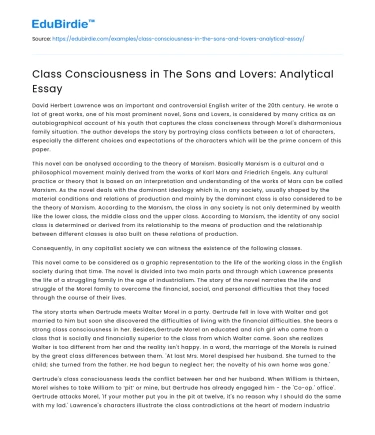David Herbert Lawrence was an important and controversial English writer of the 20th century. He wrote a lot of great works, one of his most prominent novel, Sons and Lovers, is considered by many critics as an autobiographical account of his youth that captures the class conciseness through Morel's disharmonious family situation. The author develops the story by portraying class conflicts between a lot of characters, especially the different choices and expectations of the characters which will be the prime concern of this paper.
This novel can be analysed according to the theory of Marxism. Basically Marxism is a cultural and a philosophical movement mainly derived from the works of Karl Marx and Friedrich Engels. Any cultural practice or theory that is based on an interpretation and understanding of the works of Marx can be called Marxism. As the novel deals with the dominant ideology which is, in any society, usually shaped by the material conditions and relations of production and mainly by the dominant class is also considered to be the theory of Marxism. According to the Marxism, the class in any society is not only determined by wealth like the lower class, the middle class and the upper class. According to Marxism, the identity of any social class is determined or derived from its relationship to the means of production and the relationship between different classes is also built on these relations of production.
Save your time!
We can take care of your essay
- Proper editing and formatting
- Free revision, title page, and bibliography
- Flexible prices and money-back guarantee
Consequently, in any capitalist society we can witness the existence of the following classes.
This novel came to be considered as a graphic representation to the life of the working class in the English society during that time. The novel is divided into two main parts and through which Lawrence presents the life of a struggling family in the age of industrialism. The story of the novel narrates the life and struggle of the Morel family to overcome the financial, social, and personal difficulties that they faced through the course of their lives.
The story starts when Gertrude meets Walter Morel in a party. Gertrude fell in love with Walter and got married to him but soon she discovered the difficulties of living with the financial difficulties. She bears a strong class consciousness in her. Besides,Gertrude Morel an educated and rich girl who came from a class that is socially and financially superior to the class from which Walter came. Soon she realizes Walter is too different from her and the reality isn't happy. In a word, the marriage of the Morels is ruined by the great class differences between them. 'At last Mrs. Morel despised her husband. She turned to the child; she turned from the father. He had begun to neglect her; the novelty of his own home was gone.'
Gertrude's class consciousness leads the conflict between her and her husband. When William is thirteen, Morel wishes to take William to ‘pit’ or mine, but Gertrude has already engaged him - the 'Co-op.' office'. Gertrude attacks Morel, 'If your mother put you in the pit at twelve, it's no reason why I should do the same with my lad.' Lawrence's characters illustrate the class contradictions at the heart of modern industrial society.
In the light of these difficulties the passion between the couple faded and Gertrude decided to shift her passion and attention to her sons instead of her husband beginning with her elderly son William. Toward the end of the Victorian era, even working-class mothers aimed at a higher standard of culture, achievement and social standing than that into which they were born. Mothers, like Gertrude, held their sons close to them, creating virtual images of themselves in their sons.
Mrs. Morel gave her attention and passion to William who left the house for a job in the city and soon achieved his financial and social independence from both the family and his mother. After living in the middle class for a while, William died as a result of a skin disease leaving his mother with a broken heart. But soon the mother shifted her attention to her other son Paul. Paul, in his turn, worked in a factory and experienced love with girls such as Miriam and Clara. Unable to escape from the emotional control of his mother, Paul left the two girls and returned to take care of his dying mother.
After the death of Mrs. Morel, Paul felt lost especially with his inability to return to Clara or resuming his interest in drawing. The novel ends with Paul who lost everything but decided not to give up to darkness. The first glimpse of Marxism can be found in the authentic relationship between the novel and the real life of the author. The life situations of the central character in ‘Sons and Lovers’ could be understood better using the Marxist concepts of class consciousness.
In ‘Sons and Lovers’ is depicted a society, which in the process of under going a change from the old productive relations into capitalist mode of production. The 'casual' analysis of the capitalist society tries to understand it coming into existence and the ways it operates where as the casual mode feels that in spite of the ills of such a society, nothing much can be done to change it.






 Stuck on your essay?
Stuck on your essay?

